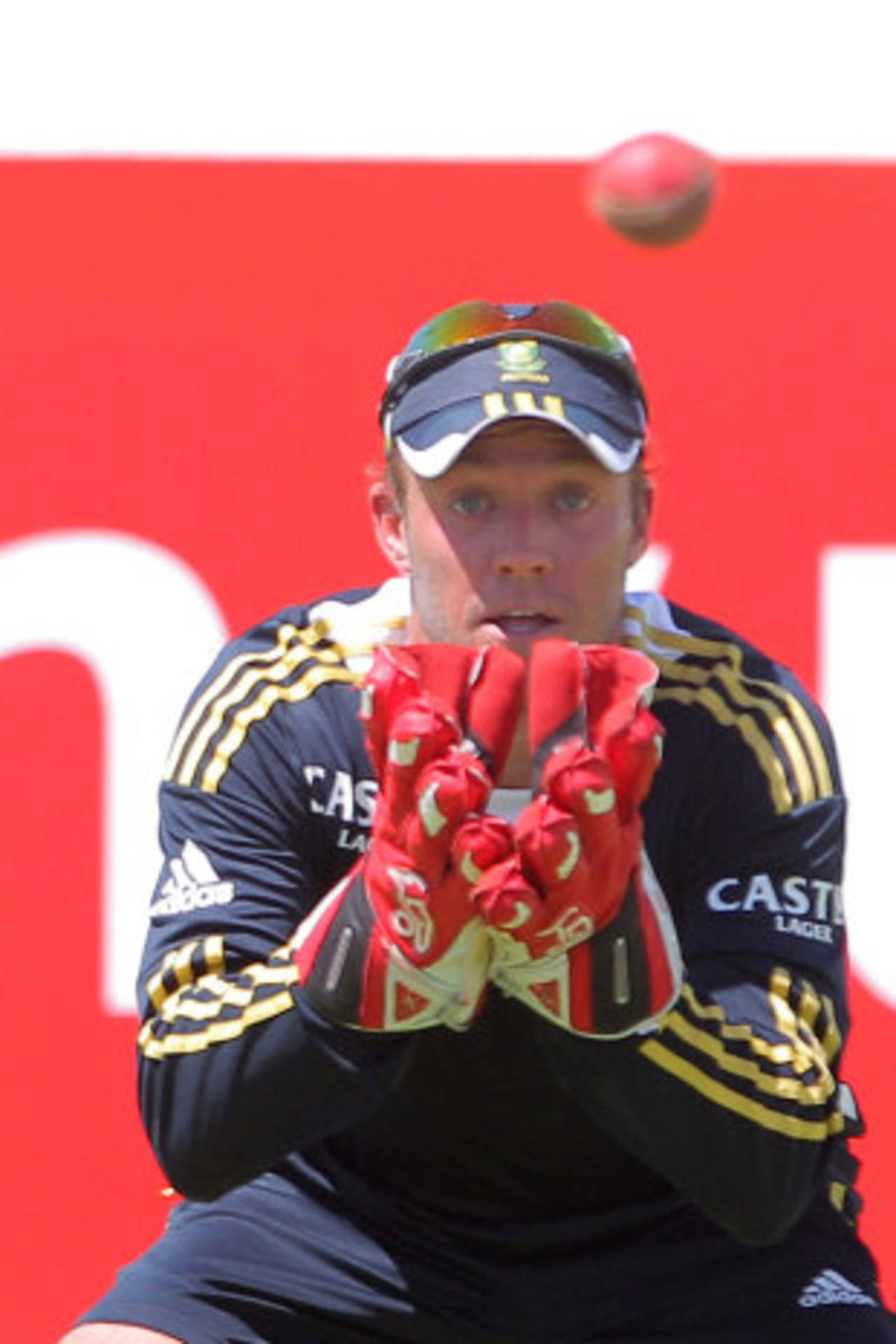AB de Villiers has, for the first time, admitted being overburdened by his roles as a batsman, wicket-keeper and part of South Africa's leadership core. His acknowledgment comes after a policy change to the limited-overs squads which has seen the gloves taken away from de Villiers to allow him to focus on captaincy.
"I have always felt a bit rushed trying to captain the side and keep wicket," de Villiers said ahead of the first ODI against New Zealand in Paarl. "I will probably stand at mid-off and be able to communicate with my bowlers a lot better as well as get a better perspective of the game."
De Villiers latest statement contrasts with his assessment of his own handling of the triple task the last time South Africa played limited-overs cricket, at the World Twenty20 in September. De Villiers required three weeks rest after the tournament after he aggravated his chronic back condition during the tour of England and the ICC event.
Despite the recurrence of the injury, de Villiers insisted he was not paying the price for taking on too much. "I don't believe there is too much on my plate; I really enjoy the captaincy and batting and keeping. It's what I am going to do," he said, while even going as far as to say he would continue in all three roles irrespective of the effect it had. "If I miss out on a year of my career, so be it."
Since that tournament, de Villiers has played five Test matches for South Africa and one domestic 50-over match. De Villiers complained of a tired body after turning out for his franchise, the Titans in the one-day cup playoff. He scored a hundred in a losing cause that day but was so worn out from the cumulative effects of that match after a Test series that he to be rested from the three-match T20 series against New Zealand, a request which was granted.
In that time, de Villiers also "changed his mind," according to convenor of selectors Andrew Hudson about 'keeping at Test level. When de Villiers was required to take over from Mark Boucher in and emergency situation in England, he was reluctant to become the permanent wicket-keeper. During the third Test against Australia in Perth in early December, Hudson spoke to de Villiers again and he asked if he could continue in the role. The selection panel and team management agreed.
But de Villiers 'keeping at Test level has widespread implications beginning with his own batting. Crouching behind the stumps for extended periods seemed to hinder de Villiers ability to bat with freedom, which South Africa needs him to do. As yet, that theory has not been completely disproved. The 169 he blazed at the WACA came after he was in the field for three overs more than an ODI. Even against New Zealand, where he scored two half-centuries, periods on the park were minimal thanks to the visitor's short batting time.
It has been enough to convince the powers that be, though and de Villiers will continue as Test wicket-keeper but in order do that, he has had to give up the gloves in shorter formats. Quinton de Kock did the job in the T20s and will do in the ODIs, to allow de Villiers time to develop his leadership style, 18 months after taking over the job.
De Kock's selection is also a means to ensure de Villiers' back can be rested, although how much it will be questionable. Gary Kirsten revealed yesterday that de Villiers finds keeping in 50-overs "more intense," than in a Test. Previously de Villiers went on record saying he found it harder on his body to be in the outfield - where he will now prowl - than to keep wicket.
After the three ODIs, it may be clearer which discipline takes greater toll on de Villiers because his back can be compared to the way it felt after the World T20. Should de Villiers first guess be correct and he comes out worse, he may have to consider 'keeping again which will require another rethink of South Africa's limited-overs policy. Should he cope well with fielding again, it could open up another option for South Africa at Test level, the specialist wicket-keeper, should they require it.
As a result, the debate over South Africa's wicket-keeping options is far from closed. Life after Boucher was always going to be uncertain because of the poor planning that preceded it. Even as Boucher's form dipped, no clear attempts were made to identify or groom a successor.
At that time, de Villiers himself distanced himself from wicket-keeping permanently as he confirmed his career goal was simply to become the best batsman in the world. Recently, he has spoken of his desire to improve his wicket-keeping, to captain the side as best he can and to contribute with the bat.
To change one's mind or expand one's goals is only natural, for the administrators to accommodate that if it works with their team plans is also understandable but it all points to an obvious question that must be asked soon: when does too much room for individual flexibility cause too much disruption to the team's needs?
Firdose Moonda is ESPNcricinfo's South Africa correspondent
